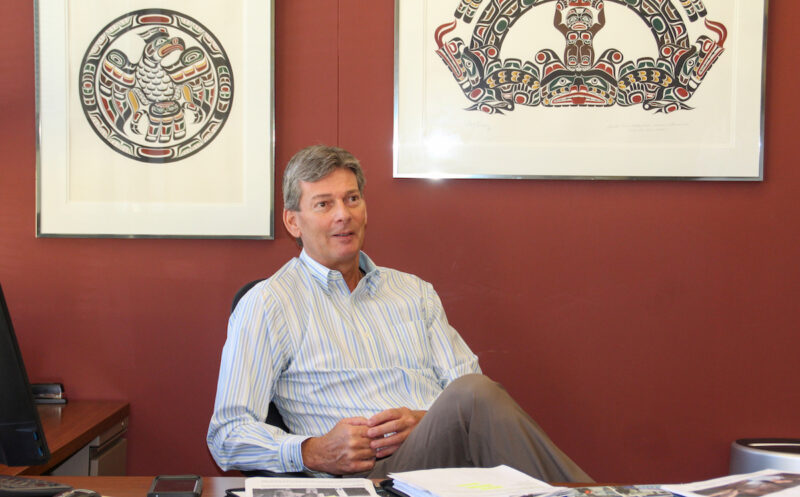Discovery Islands’ salmon farm closures will kill 1,498 jobs
Initial industry estimate pegs economic loss in North Vancouver Island’s coastal communities, dependent on salmon farms, at $379.7 million
By Fabian Dawson
SeaWestNews
The closure of salmon farms in the Discovery Islands of BC will result in 1,498 people losing their jobs, mostly in the coastal communities of North Vancouver Island, an initial estimate by the industry shows.
The closures over the next 18 months will also result in the loss of $379.7 million in economic output for the region, a labour income loss of $84.6 million and a tax hit for the region amounting to $21 million.
The Gross Domestic Product (GDP) of BC will ultimately shrink by $135.6 million as a result of the decision, that will devastate the economies of Campbell River, Gold River, Port McNeill and Port Hardy
“The numbers are staggering and we are scrambling to drill down further to understand and address what needs to be done,” said Andrew Adams, Mayor of Campbell River.
“Campbell River will feel the brunt of this decision as about 60 percent of the Discovery Islands salmon farms are serviced from here,” he said.
Adams together with the other mayors in the area are planning an emergency economic summit next week to address the pre-Christmas decision by Bernadette Jordan, Canada’s Minister of Fisheries and Oceans, to phase out the 19 salmon farms that have been operating in the Discovery Islands for the past 35 years.
She confirmed that the decision had little to do with science and everything to do with social licence and that it was made after consultations with seven First Nations in the area.
Nine peer-reviewed scientific studies which showed that salmon farms in the area had only minimal impact on wild stocks migrating through the waters off Discovery Islands, were ignored in favour of the anti-fish farm activists and their First Nations allies.
Prior to the Discovery Islands’ decision, the BC Salmon Farmers Association (BCSFA) unveiled plans to invest $1.4 billion in innovation, new technology and infrastructure through 2050 and create almost 10,000 new jobs.
Several projects outlined in the plan, aimed to propel the post-pandemic recovery of BC, are now being reconsidered.
Among the projects that maybe shelved or downsized is a $22 million state-of the art seafood processing plant by the Brown’s Bay Packing Company in Campbell River.
Another project that is being impacted is the Aquatrans Distributors Inc. new depot in Campbell River. The company, employs 75 people and operates a fleet of trucks, that serves the Pacific Northwest.
Meanwhile, Adams took issue with the region’s MP Rachel Blaney, who in local media interviews suggested that she had dialogues with local mayors about the decision.
“As the Mayor of Campbell River, the largest city on the North Island known as the Salmon Capital of the World, I am appalled by this post (on Facebook) that suggests that our MP has had any dialogue with North Island Mayors or leaders and workers in the Aquaculture industry. This is simply not true.
It is the North Island Mayors who have been working throughout the holidays with industry, stakeholders, and employees who are devastated by this announcement and the lack of consultation, particularly from our local federal representative. To suggest otherwise is just shameful!” he said on social media.
Adams, together with Mayor Brad Unger of Gold River, Mayor Gaby Wickstrom of Port McNeill and Mayor Dennis Dugas of Port Hardy wrote a letter last night to MP Blaney urging her to keep to her pre-election pledge to “work with people throughout the riding and across the country to help manage dealings with the federal government”.
“As local government representatives, and industry, you have never engaged with any of us at any time on this issue,” the mayors’ letter, read in part.
“While you have been clear on your position to move aquaculture to a land-based industry, you have at no time engaged with any of us, nor have you acknowledged the realities of the advancements in technology, the science, and the sustainability of the industry in the region that you represent.
“There is no question the industry had issues in the early days, but there have been numerous science-based advancements in the past decade. Significant investments in advanced technology and innovation that have all been fully supported by science have created a path forward for a safe sustainable aquaculture industry, an industry that ensures the preservation of our coastal waters and the health and sustainability of our critically important wild stocks and ocean environment,” the mayors said.
(Image shows Mayor Andrew Adams of Campbell River)

